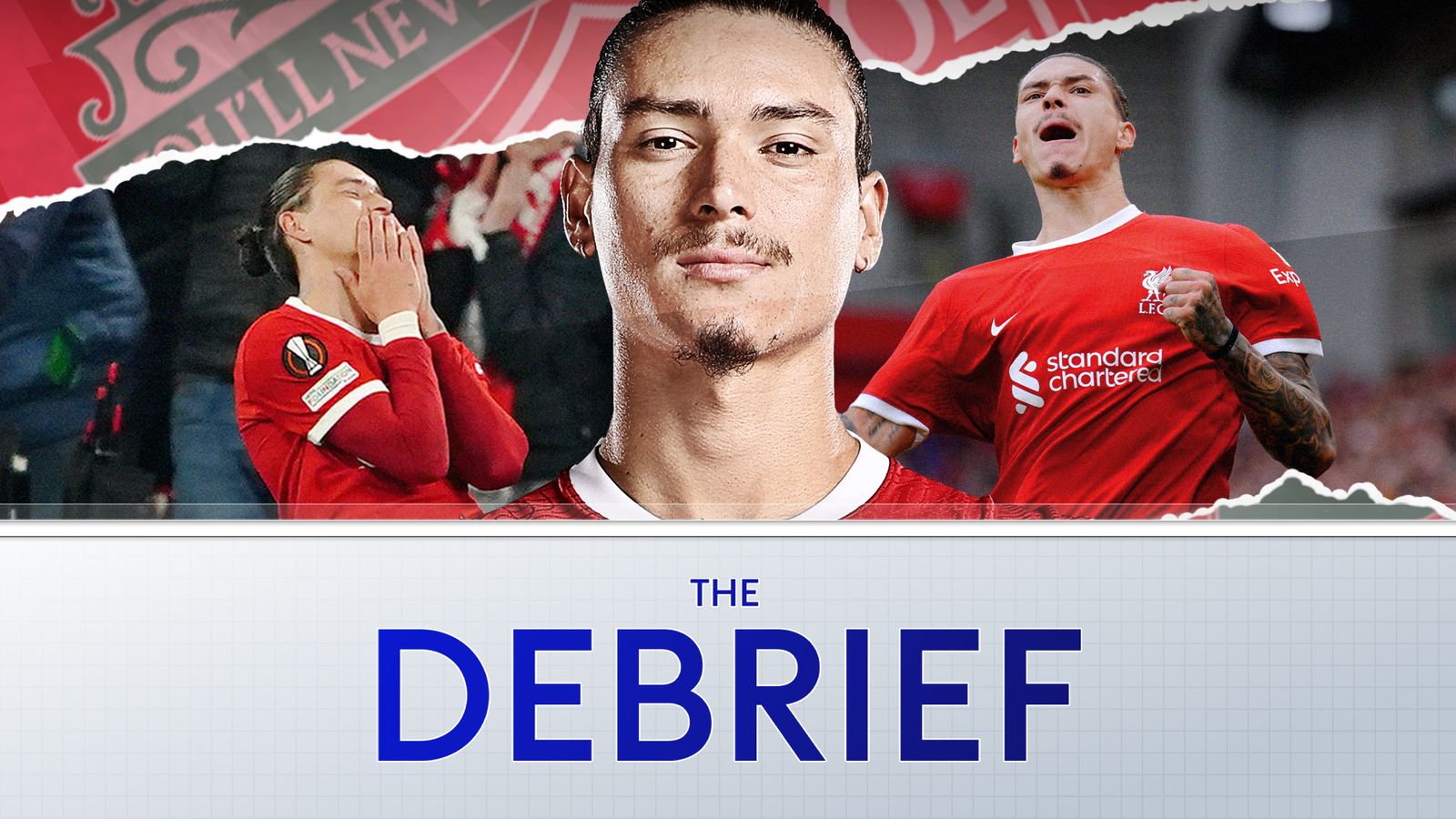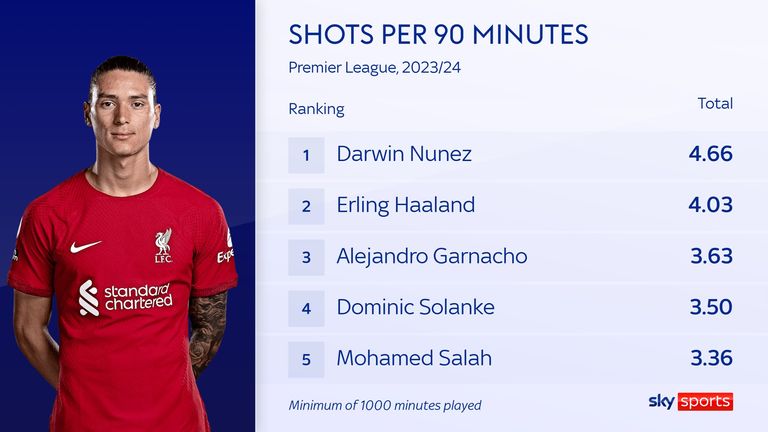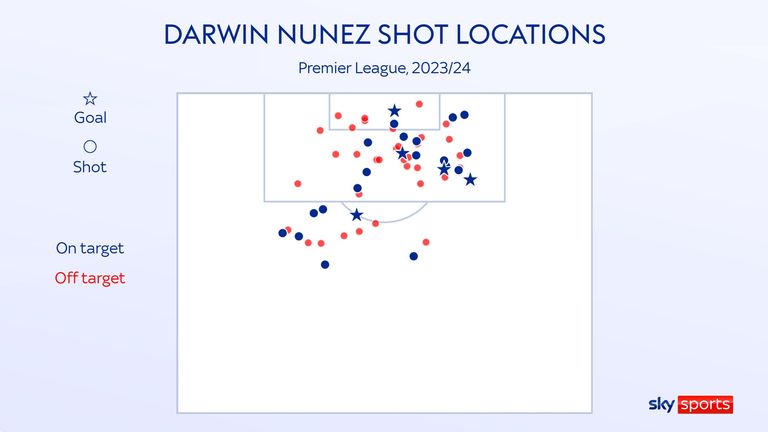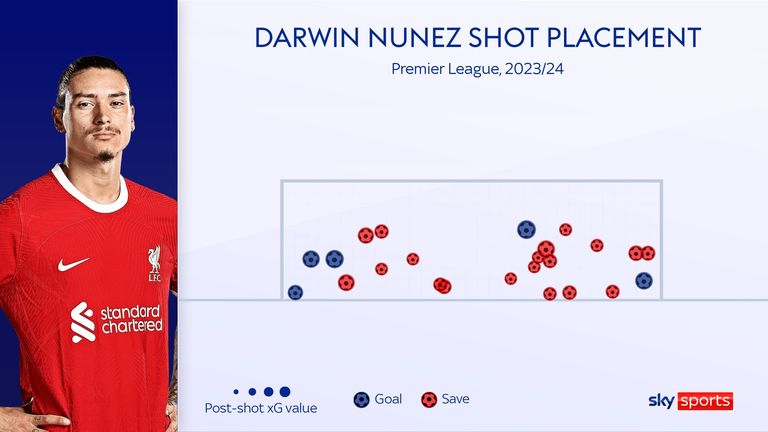Another four shots without a goal in Liverpool’s FA Cup win at Arsenal, Darwin Nunez continues to be everything but ruthless. But it is now 17 unbeaten with him in the team. Liverpool’s three defeats this season have come when he has been omitted.
It strikes at the heart of the Nunez conundrum. Conversations about the Uruguayan forward’s finishing are unlikely to go away – because Nunez himself is not going away. He has become a hugely important figure for Jurgen Klopp in this new Liverpool side.
Arsenal could not cope with him once he drifted to the left. Newcastle had been overwhelmed by his rampaging runs through the middle. The only person capable of stopping Nunez doing what he wants on the football field remains Nunez himself.
This human blunderbuss, memorably described as an agent of chaos in his first season following his move from Benfica, continues to wreak havoc in the final third of the pitch. But his record of one goal in his last 15 appearances for Liverpool tells another tale.
In that 4-2 win over Newcastle, Nunez’s individual expected-goals total of 1.7 was, according to Opta, the highest by any player without scoring in the past three years of the Premier League. This season alone, six men have scored hat-tricks from fewer chances.
On first-name terms with the ball but unacquainted with the net, Nunez’s opportunities came and went. There were eight shots in total, seven from inside the box – and Cody Gakpo replaced him after just 64 minutes. Three of Liverpool’s goals came after that.
And yet, when Klopp later commented that “it is completely different if Cody plays there” he meant it as a compliment. “We needed him there,” he explained. “He kept [Sven] Botman and [Fabian] Schar together and that gave us the space for everything else.”
Nunez does not just occupy defenders, he unsettles them. His first one-on-one against Newcastle highlighted that. “He gets the chance because he has got the pace and power,” Jamie Carragher told Sky Sports. “If that were Gakpo, he does not even get the chance.”
The statistics underline this point. Nunez averages 4.66 shots per 90 minutes in the Premier League this season. He shoots more often than Erling Haaland, more often than anybody else in the competition. It is usually a reliable indicator of who will score goals.
But that link between shots and goals breaks down with Nunez.
It is not because he is shooting from outlandish locations. It is true that there have been a few too many attempts from outside the box. He even scored from there against Burnley. But the bulk of his efforts have come from close range, where a striker should be.
He has missed big chances, 18 of them. In fact, nobody has missed as many in the Premier League this season. But again, the fact that Haaland is right behind Nunez with 17 big chances missed of his own is an indication that this need not be a big problem.
Klopp understands instinctively that shots tend to bring goals.
He made this point after the Newcastle game.
“As long as Darwin has all these moments that he had today, then it is all fine. I do not know the amount of goals we have scored this season, but it is a lot, and Darwin will score, there is no doubt about it. It is all fine, no one has to worry about Darwin.”
So, how much of this is bad luck? Will Nunez regress to the mean?
Some might be encouraged by the fact that his post-shot expected-goals total is better than his expected-goals total. That is to say, statistically, the models would expect him to score even more of his chances based on where the ball went after he kicked or headed it.
This contrasts, for example, with Chelsea’s Nicolas Jackson, whose post-shot numbers are down – reflecting the fact that he has failed to hit the target with some of his clearest openings this season.
Nunez is hitting the target. But he is hitting the goalkeeper.
The result is the biggest disparity between expected goals on target and actual goals of any player. In fact, it is double the deficit of anyone bar Neal Maupay. Either Nunez is the victim of uniquely impressive goalkeeping or something else is happening here.
Some of his shots have been too safe, side-footed attempts down the middle. “He is not clinical,” argues Carragher. “When he has that split-second to think, that is always a big problem. When he does it off instinct, more often than not it finds the back of the net.”
Maybe confidence, as much as technique, will make the difference. Finishing is undoubtedly a skill – both Harry Kane and Heung-Min Son outperformed their expected-goals numbers for six consecutive seasons in the Premier League. But others vary considerably.
Liverpool fans will recall the transformation of Nunez’s compatriot Luis Suarez at Anfield. His first full season yielded only 11 goals despite an expected-goals total of 17.04. In that memorable 2013/14 campaign, he parlayed 20.55 expected goals into 31.
Nunez need not replicate this to be useful. He has already proven that. But in a title race that could come down to small margins, while others focus on key men absent (Mohamed Salah) and returning (Kevin De Bruyne), an uptick in his finishing could yet be decisive.





